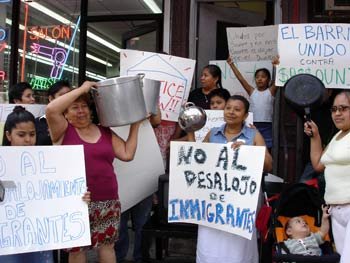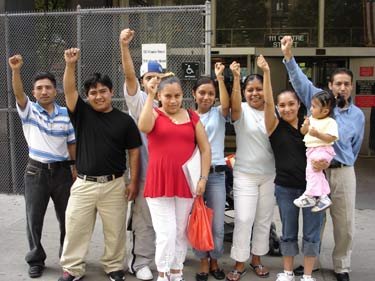


“Walking, We Ask Questions”
The Other Campaign in Spanish Harlem
By RJ Maccani
The Other Journalism with the Other Campaign on the Other Side
August 31, 2006
Inspired by the Black Panther Party and Chicago’s Young Lords, the New York Young Lords Party launched a surprising first campaign in the summer of 1969. Called “The Garbage Offensive,” it was designed to force the New York City Sanitation Department to make more frequent pick-ups in East Harlem (often referred to as Spanish Harlem or simply “El Barrio”). The Garbage Offensive won the trust and respect of their neighbors and garnered the Young Lords Party local and national visibility. Although inspired by the Black Panther’s community-based programs, the New York Young Lords didn’t expect to be picking up garbage when they discussed forming an organization to improve living conditions in their primarily Puerto Rican neighborhood. Before launching their first campaign, however, the Young Lords went to their neighbors to find out what they most wanted to see changed. The Garbage Offensive was the fruit of this dialogue, the will of the people. Proudly inclusive of their Latino and Black neighbors, the New York Young Lords’ center of gravity was Nuyorican (Puerto Rican New Yorkers), and the independence of their homeland, Puerto Rico, a central concern.
 Photos: Movimiento por Justicia del Barrio |
Movement for Justice in El Barrio
MJB was born almost two years ago when residents of El Barrio, some of them congregants of Saint Cecilia’s Church on East 106th Street, began to organize against problems with their landlords. To support them in addressing their grievances, the church hired Juan Haro, a founding member of AZUL (Amanecer Zapatista Unidos en la Lucha), a Mexican immigrant organization inspired by and in solidarity with the Zapatistas. Haro worked with the residents, they successfully organized against the landlords to win their demands, and the church ended its involvement.
With residents in five buildings organized, Haro and the founding members decided to form MJB as an immigrant-led, community-based organization that would fight for social justice and against all forms of oppression in El Barrio. Over the past two years, MJB has employed media tours, court actions, protests, and direct actions against landlords, mortgage lenders, and city institutions to challenge the unjust housing system in El Barrio. Through this work, MJB has grown to 180 members in 16 buildings. In August of 2005, MJB began studying locally based social justice movements from around the world in order to better understand their own struggle in its global and historical context. The Zapatistas and the Other Campaign were among the movements studied. Through this process they decided to adhere to the Zapatistas’ Sixth Declaration of the Lacandon Jungle and, since a majority of their membership is Mexican, MJB decided to join the Other Campaign as well. And they did not do so quietly…
 |
In July of this year MJB launched its latest initiative, a comprehensive community consultation process called “La Consulta del Barrio.” MJB is ready to grow and, as you will see, the Consulta is very inspired by the Other Campaign. Through town hall meetings, community dialogues, street outreach, door knocking, house meetings, and a community-wide vote, MJB’s members have consulted their neighbors in El Barrio for direction and to decide which problem, in addition to gentrification, they will begin organizing around. I attended their first public forum held at St. Cecelia’s Church where, less than two years before, the complaints of a few disgruntled tenants helped to sow the seeds of MJB…
La Consulta del Barrio
On July 23rd, residents of El Barrio trickled in to the sparse basement of St. Cecilia’s for the first public meeting of the Consulta. They received bottled water, a photocopied El Diario NY article about MJB, and copies of the Zapatistas’ Sixth Declaration to read while waiting for the forum to begin. Young children were invited to draw and play. With half of the room’s 60 folding chairs filled, the organizers decided it was time to get things started.
Rotating between male and female members, MJB introduced its organization and the reasons for the Consulta. One member summed up the importance of the Consulta with humility, “We are but one organization. How can we make decisions for El Barrio? We’ve learned that we can fight together and that the people themselves can fight without having to be under one leader.” They capped off the introduction by explaining a bit about who the Zapatistas are and why they, MJB, are adherents to the Zapatistas’ Sixth Declaration. Before moving into a larger conversation about problems in El Barrio, they showed their video, “Message for the Zapatistas.”
 |
This was as clear and forward an introduction as I’ve ever seen and it led into a group discussion of MJB’s next steps. Through an internal consultation of its membership, MJB had generated a list of the eight biggest problems in El Barrio other than gentrification: the sexual harassment of waitresses, mistreatment in the hospitals, bad service at the Mexican Consulate, police abuse, jobs paying less than the state minimum wage ($6.75 per hour), the high cost of public transportation, the proposed immigration laws, and the high cost of sending money back home ($4-5 for a $100 remittance) as well as the mistreatment they receive from the intermediary companies.
Nearly everyone in attendance spoke up regarding the problems in El Barrio and the possibility of organizing to make change. Some people thought that MJB should expand its organizing beyond the borders of East Harlem and others thought that they should not pick just one problem but, rather, attempt to fight all these problems simultaneously. At the conclusion of the forum each attendee filled out a ballot with their name, phone number, and address, and circled the top three problems they would like to see addressed by MJB. Before leaving, attendees took stacks of flyers to hand out to their friends, family, and neighbors, providing information on the location and hours of the public voting booths MJB was setting up in El Barrio as part of the Consulta. And for people who were not able to attend a forum or go to the voting booths, the flyers included MJB’s phone number for people to call, leave their contact information, and vote by phone.
Stage Two…
The idea of the Consulta is not just to generate consciousness and symbolic participation (voting) in the community but also rather to inspire more people to become active in the struggle. After a month of activity, the first stage of the Consulta del Barrio is complete with 782 immigrants in El Barrio having cast votes. Just announced, the three problems in El Barrio that received the most votes are 1) jobs that pay less than minimum wage; 2) the proposed immigration laws; and 3) bad services at the Mexican Consulate.
Stage two of the Consulta del Barrio is set to begin. Community dialogues will be held for each of these three problems, starting with the problem of bad services at the Mexican Consulate (including having to wait in line overnight just to receive service). The second forum will be about jobs paying less than minimum wage and the third on immigration laws. Based on the level of interest in the community at each forum, MJB will decide which problem, in addition to gentrification, they will prioritize.
The Struggle is Listening
Amidst the din caused by electoral fraud, it has been harder to hear in these past few months the scream for justice coming from Mexico’s Other Campaign. There are two Zapatista sayings that are well worth remembering in these times. They are, “We walk slowly because we are going very far” and “Walking, we ask questions.” In less than a year since the Other Campaign was announced from the mountains of Southeast Mexico, the Other Campaign has walked from the Zapatista communities in Chiapas, through the 32 territories of Mexico, and across the border all the way up to East Harlem.
The Other Campaign grows not by captivating the audience with flashy advertisements but, rather, through listening and walking. Like the Young Lords of Spanish Harlem’s past, the Movement for Justice in El Barrio is dialoguing with its neighbors today and preparing for surprising results tomorrow. Whether fighting for the freedom of its political prisoners in Mexico or halting gentrification in New York City’s El Barrio, the Other Campaign continues to walk and listen and grow.
RJ Maccani reported for the Other Journalism on the activities of the Other Campaign in the state of Oaxaca as a member of the “Ricardo Flores Magón Brigade.” He lives in Brooklyn where he organizes with the NYC Childcare Collective and publishes the blog Zapagringo.
MJB can be contacted directly by writing to movimientoporjusticiadelbarrio[at]yahoo.com.
Click here for more Narco News coverage of Mexico
Lea Ud. el Artículo en Español
- The Fund for Authentic Journalism
For more Narco News, click here.




